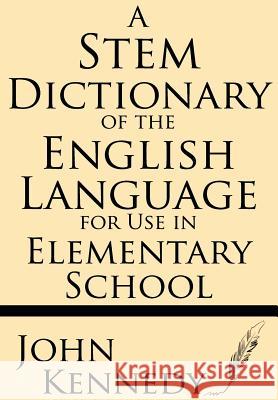A Stem Dictionary of the English Language for Use in Elementary School » książka
A Stem Dictionary of the English Language for Use in Elementary School
ISBN-13: 9781628450552 / Angielski / Miękka / 2013 / 294 str.
A Stem Dictionary of the English Language for Use in Elementary School
By John Kennedy
Preface
Language is the external representative of thought. It is not only the means of expressing thought, but it is also the necessary means or condition of extended thinking. It is, therefore, an immediate and ever-pressing factor in education; it is the available form of another's thought; it is the means of developing and perfecting our own. "Thoughts disentangle passing over the lip." But this disentanglement implies a corresponding disentanglement of language; it implies a sensitive and delicate perception of the scope and application of terms. This sensitiveness and delicacy of perception is conditioned in the power to resolve secondary expressions into the primary forms from which they have sprung. Mastery of a subject implies the possession of every elementary notion involved in it; a corresponding mastery of language must therefore also imply an acquaintance with all its devices for expressing elementary notions. Primary words are but one class of these devices. There are, indeed, in the English language four classes of them, viz.: primary words, prefixes, suffixes, and stems. There can be no reliable extension of vocabulary without a recognition of the form and value of these several elements; and without them all study of subjects is subjected to a dead strain, resulting either in failure and discouragement or in superficial knowledge. The definition of a word built up in any manner out of a familiar primary word is superfluous, because the word explains itself. And if it did not explain itself, the definition would be useless as a means of enlarging vocabulary.
Definition, however, has a very important function int eh logical treatment of a subject, or in carrying on a line of reasoning. But it is not a reliable or effective means of enlarging one's vocabulary; and without a ready vocabulary all study is impeded.
The mind proceeds by units of effort; it suffers violence when required to treat multiplicity as unity. It is checked and confounded instead of being stimulated and directed. So likewise a word built up from a familiar stem needs no definition; it explains itself; and if the stem be not familiar, then any attempt to use the term must be attended with all the evils mentioned above. Word-structure should therefore be made the basis of elementary education, instead of its being reserved as an exercise for educated people only.
A stem is an object having a very observable form and value; and this form and value may be fixed by a minimum of observation. Why, therefore, ignore the stems during the elementary stage of education? They have been ignored in many cases because of the prevalent fallacy that...
------------------------------------------------------------------------------------------------------------------------------------------
Windham Press is committed to bringing the lost cultural heritage of ages past into the 21st century through high-quality reproductions of original, classic printed works at affordable prices.
This book has been carefully crafted to utilize the original images of antique books rather than error-prone OCR text. This also preserves the work of the original typesetters of these classics, unknown craftsmen who laid out the text, often by hand, of each and every page you will read. Their subtle art involving judgment and interaction with the text is in many ways superior and more human than the mechanical methods utilized today, and gave each book a unique, hand-crafted feel in its text that connected the reader organically to the art of bindery and book-making.
We think these benefits are worth the occasional imperfection resulting from the age of these books at the time of scanning, and their vintage feel provides a connection to the past that goes beyond the mere words of the text











